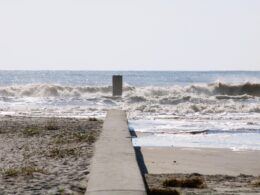Spending time on Folly Beach is a favorite pastime for many, but the presence of sharks can be a concern for some beachgoers. While shark attacks are rare, there are actions you can take to reduce the chance further. Here are some practical tips to help you prevent a shark attack while enjoying your time at the beach.
1. Stay Informed
- Check Local Reports: Before heading to the beach, check local news and beach reports for any shark sightings or warnings. Many beaches have monitoring systems in place to alert swimmers of potential shark activity.
- Lifeguard Advice: Always heed the advice and warnings of lifeguards. They are trained to spot potential dangers, including shark activity.
2. Swim in Groups
- Safety in Numbers: Sharks are more likely to target solitary individuals than groups. Swimming in groups can reduce the risk of an attack.
- Close to Shore: Stay close to the shore where help is more readily available, and sharks are less likely to venture.
3. Avoid Peak Feeding Times
- Dawn and Dusk: Avoid swimming during early morning or late evening hours when sharks are most active and feeding.
- Murky Water: Refrain from swimming in murky water where visibility is low, as sharks might mistake you for prey.
4. Avoid Wearing Shiny Jewelry
- Shiny Objects: Avoid wearing shiny jewelry, as it can mimic the appearance of fish scales, attracting sharks.
- Bright Colors: Some experts suggest avoiding brightly colored swimwear, which can also attract sharks.
5. Avoid Areas with Schools of Fish or Seals
- Feeding Grounds: Stay away from areas where there are large schools of fish or seals, as these are primary food sources for sharks.
- Bird Activity: Avoid areas where seabirds are diving into the water, as it often indicates the presence of baitfish, which can attract sharks.
6. Stay Calm and Smooth
- Avoid Splashing: Excessive splashing can attract sharks. Try to swim smoothly and calmly.
- Controlled Movements: Avoid erratic movements in the water, which can draw attention.
7. Use Shark Repellents
- Wearable Devices: Consider using shark-repellent devices that emit electric fields or sound waves designed to deter sharks.
- Chemical Repellents: Some products release chemicals that sharks find unpleasant. However, the effectiveness of these can vary.
8. Know What to Do in an Encounter
- Maintain Eye Contact: If you see a shark, try to maintain eye contact and slowly back away toward the shore.
- Defensive Posture: If a shark attacks, defend yourself by targeting its eyes, gills, or snout, which are its most sensitive areas.
9. Avoid Certain Activities
- Spearfishing: Avoid spearfishing, as the blood and movements of injured fish can attract sharks.
- Surfing and Kayaking: If you engage in surfing or kayaking, stay vigilant and avoid areas known for shark activity.
Conclusion
Shark attacks are rare, and the fear of them should not prevent you from enjoying the beach. By staying informed and following these precautionary measures, you can significantly reduce the already low risk of a shark encounter. Always remember to respect marine life and their habitats, as sharks are crucial to the health of our oceans.
For more detailed information on shark safety, you can visit National Geographic’s guide on preventing shark attacks.
Stay safe and enjoy your time at the beach!













